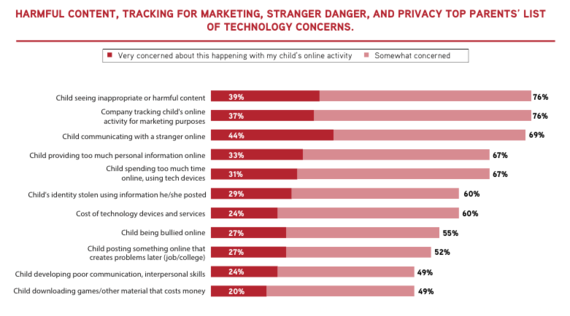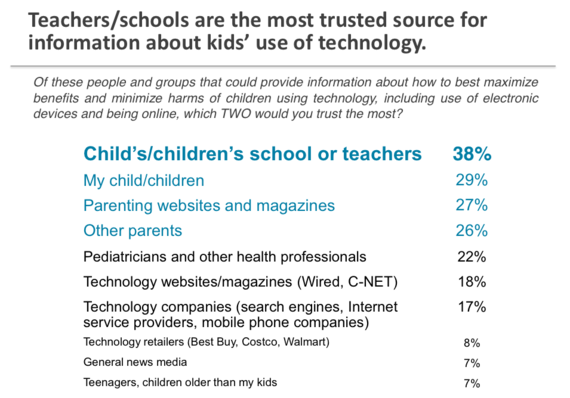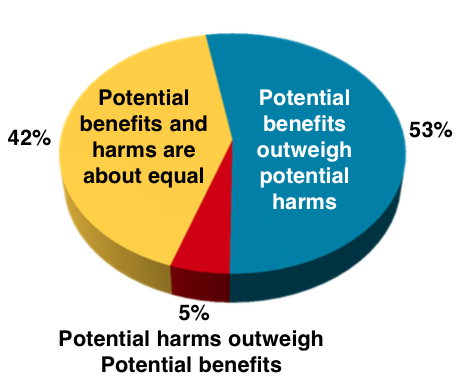
Stranger danger, online predators, cyberbullying... this is the scary talk you brace yourself for before attending a gathering about online safety, like the Family Online Safety Institute (FOSI) Conference, "Redefining Online Safety," held in Washington D.C. last week.
But surprisingly, and thankfully, the online safety conversation is changing. According to a new FOSI study, conducted by Hart Research Associates and presented at the conference, 53 percent of parents surveyed report that the benefits of their kids' using electronic devices outweigh the potential harms. And 42 percent say the two are about equal.
This research shows that parents are starting to understand that along with technology's benefits come some inherent, yet manageable, risks. What are these risks? Well, despite heavy media focus on cyberbullying, parents are actually most worried about children being tracked by online marketers and viewing inappropriate or harmful content.

There was a very clear consensus amongst the tech industry representatives, policy makers, non-profits, and academics at the FOSI event on the best way to mitigate these risks.
Education. This education should reflect the growing positive attitude about tech and include fundamentals such as digital citizenship, resiliency, coping strategies, critical thinking, accountability, compassion, ethics and empathy. Teaching kids (well, everyone really) skills like these will help create an atmosphere where the social norms that will guide the online practices of the future can grow. This is the new language of online safety.
Facebook's Policy Director for UK, Middle East and Africa Simon Milner stressed "the importance of working with schools" in accomplishing the task of teaching children these skills and FOSI's own research finds teachers and schools to be the "most trusted source for information about their kids' use of technology."

But here's the fly in the ointment: Teaching kids the resiliency and coping skills that will help keep them safe online is not happening on a wide scale, at least not in American classrooms.
It is happening is Canada, however, where media literacy is a mandated policy and where they are now reaping the positive results. According to MediaSmarts' Co-Executive Director Jane Tallim, who presented findings from their own research titled "Young Canadians in a Wired World," Canadian students are careful about their personal information, know how to manage privacy settings and are thoughtful about crafting their online image.
As a digital literacy educator in the U.S., I'm one of the lucky few afforded the opportunity to teach students these skills in school. In 7th grade students explore "online privacy" by first learning the vocabulary -- cookies, third parties, personal information, targeting, tracking, etc. Then they tackle the hard stuff, reading the "Privacy Policies" and "Terms of Use" of the sites they use most, like Instagram, Snapchat and Vine. Believe it or not, students actually enjoy using their critical thinking skills on something that is relevant to their lives, and they get excited about what they learn. For instance, my students found a discrepancy between the minimum "age of use" on Snapchat's website (13) and the "age of use" posted in the iTunes Store (12+) and they're awaiting a response to an email inquiry to Snapchat about it.
Lessons like these help answer the "three important privacy questions" that Michael Kaiser, Executive Director of the National Cyber Security Alliance, mentioned at the FOSI Conference:
What are you collecting about me, how do you use it, and what can I control?
Students deserve to discover the answer to these important questions in class, with peers, before they begin giving away irretrievable personal information naively. Learning about the economy of the Internet, a place where they will be trading personal data for customized information every day of their lives, empowers kids like one boy who after learning about this whole process called it, "creepy, but also really cool."
Understanding the delicate balance between creepy and cool is an essential skill today. I'm hopeful that FOSI's work "redefining online safety" into positive affirmations will finally chip away at the resistance to making digital literacy lessons a top priority.
In a workshop at the end of the FOSI Conference, Online Trust and Safety Advocate Kim Sanchez and Senior Research Fellow at the Mercatus Center at George Mason University Adam Thierer led a brainstorming session that yielded some possible new definitions for online safety, such as:
Living life well online
Minimizing risks and maximizing benefits
Reducing harm from digital challenges
They all sound good to me.
